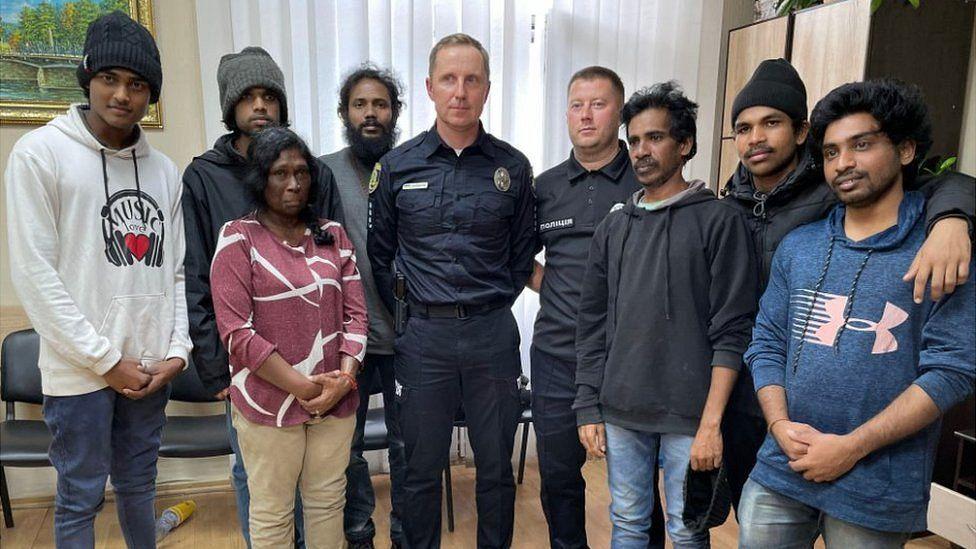Jakarta –
The reconquest of the city of Izyum by the Ukrainian army revealed a series of allegations of atrocities committed by the Russian army.
One of the victims was a Sri Lankan in the city.
Warning: Some details in this article may make you uncomfortable.
ANNOUNCEMENT
Swipe to resume content
–
“I never thought I could get out of this city alive,” said Dilujan Paththinajakan.
Dilujan was one of the seven Sinhalese captured by Russian troops in Izyum last May.
They were captured on foot, in order to escape, from their home city, Kupiansk, in northeastern Ukraine, to their relatives’ home in Kharkiv.
Read it too:
The tears of joy were unstoppable when she was able to contact her family for the first time in months. (BBC)
The Kupiansk-Kharkiv distance is approximately 120 kilometers.
They were captured by the Russian army as they passed the first checkpoint.
Their hands were tied, their eyes covered with a cloth and taken from a machine tool company in Vovchansk, near the Russian border.
The arrest at this checkpoint marked the beginning of four months of difficult times. These Sri Lankans were held captive, in forced labor and even tortured.
In fact, when they leave Sri Lanka, they hope to continue their studies or find work.
However, in the hands of the Russian army they became prisoners. The food they received was minimal and they only used the bathroom once, and it was only for two minutes.
Shower even just two minutes.
‘Toenails removed with pliers’
The men, who were 20 years old on average, were all housed in the same room.
The only woman, Mary Edit Uthaikumar, who is 50, was placed in a separate room.
“We were put in a room where they beat us when we went to the bathroom. They didn’t show us. We were there for three months,” Mary said.
Mary, whose face is marked by a car bomb, has heart problems. What made him unhappy was not the effects of heart disease, but the loneliness during detention.
“When I was alone, I felt worried and scared. They gave me the pills, but I didn’t take them,” said Mary.
Other prisoners suffered worse treatment.
Some were tortured and other prisoners had their toenails removed with pliers.
“We were put in a room where they beat us when we went to the bathroom. They didn’t show us. We were there for three months,” Mary said.
Mary, whose face is marked by a car bomb, has heart problems. What made him unhappy was not because of the effects of heart disease, but himself while in detention.
“When I was alone, I felt worried and scared. They gave me the pills, but I didn’t take them,” said Mary.
Other prisoners suffered worse treatment.
Some were tortured and other prisoners had their toenails removed with pliers.
They were also beaten for no reason by drunken Russian soldiers.
“They repeatedly beat us with rifles,” said Thinesh Gogenthiran, 35.
I spent two days

The Sinhalese took turns contacting the family, thanks to a cell phone loaned by a member of the Ukrainian police. (BBC)
“A soldier hit me in the stomach and I lay down for two days. Then they asked for money,” Thinesh said.
“We are very angry, but also sad. We cry every day,” said Dilukshan Robertclive, 25 years old.
“What kept us going were the family’s prayers and memories,” he added.
Russia denies targeting civilians. They also deny allegations of war crimes.
However, there are reports of atrocity cases on the ground with Ukrainian and Sri Lankan victims heavily suspected of being perpetrated by Russian troops while occupying Ukrainian cities.
Ukrainian authorities found the grave in a forest near Izyum. When some of the bodies were removed, torture scars remained.
Ukrainian President Volodymyr Zelenski said that “more than 10 torture chambers have been found” in the cities of the Kharkiv region liberated by the Ukrainian army.
Seven Sri Lankans can breathe an air of freedom after Ukrainian troops have claimed territory to the east, including Vovchansk.
Once free, they continued their journey on foot to Kharkiv. Without a means of communication, they cannot contact friends or family.
Helped by the police
But someone found them and alerted the local police.
One of the cops lent me a cell phone.
It was then that Ainkaranathan Ganesamoorthi, 40, was able to see the faces of his wife and son on a mobile phone screen for the first time in months.
He couldn’t hold back the tears of happiness.
Other Sri Lankans took turns contacting families.
As a thank you, they hugged the chief of police.
They are now in a rehabilitation center in Kharkiv.
They were given new clothes, adequate food and health checks. There is also a swimming pool and fitness center on site.
“Now I feel relieved and also very happy,” Dilukshan said with a big smile on his face.
Also take a look at “Seconds of the strike struck near the Pivdennoukrainsk nuclear reactor”:
(it it)
–


